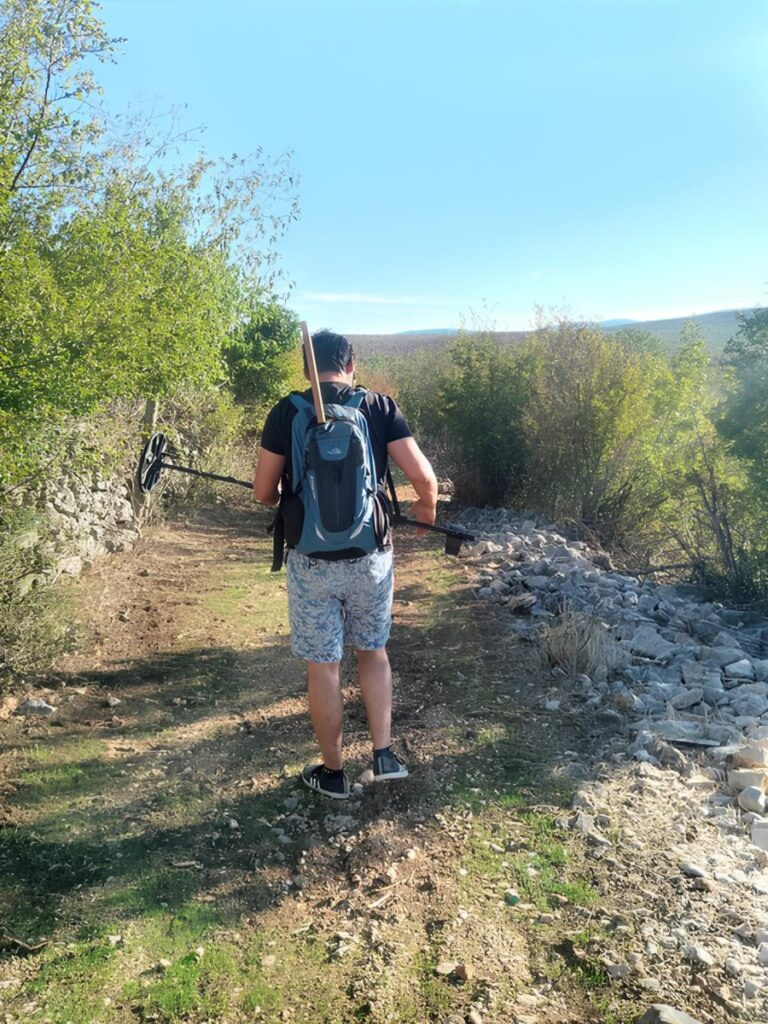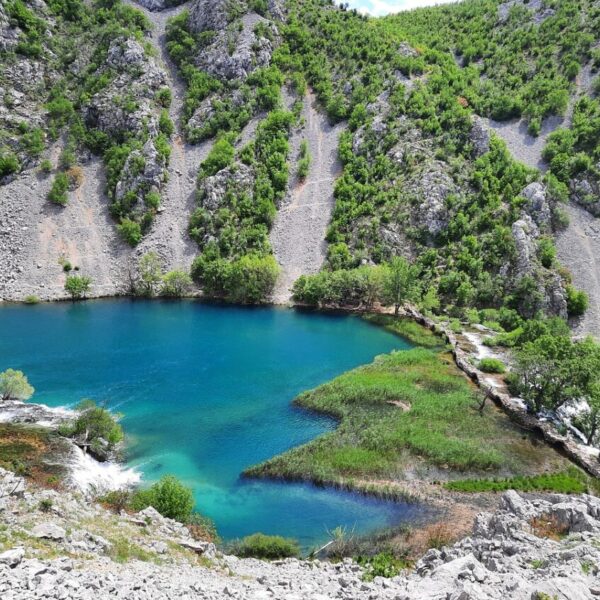Djordje is an old friend, an original and singular figure, who has willingly traveled outside the Balkans, particularly to Canada, where he lived. One day he became passionate about the history of his region, Krajina, a border territory that he sought to discover and understand. He tells us...
I bought my first metal detector in 2020, Djordje tells me, a Vanquish 440 from Minelab, an Australian brand, at the very beginning of Covid. I was stuck here alone in Karin, with no right to go anywhere beyond ten kilometers, so I had to keep myself busy. Djordje is originally from Žegar, a Serbian village in Croatia at the foot of Velebit, this coastal mountain range of the Adriatic Sea, where at the beginning of the 16th century, Wallachian, Slavic, or Magyar soldiers fleeing Ottoman invasions were settled, refusing to convert, to guard the border of the Austro-Hungarian Empire in exchange for land and tax exemptions. This is the case for his mother's family, born Komazec, who came from Herzegovina and settled on this border with Bosnia, in this region called Krajina, this military "confinement," kraj meaning the end, to defend the Empire against raids by the Akindjis, those irregular cavalry troops of the Ottoman Empire who profited from raids.
It is said that this land was invaded by the Ottomans, but that is not entirely accurate. Most of the time it was mainly invaded by Bosniaks from the other side of the mountain, who had chosen to convert to Islam to remain on their lands.
It was here, near the Krupa monastery, that I discovered my first Roman coin. On one side was the profile of Apollo, and on the other a chariot drawn by four horses. When I held it in my hand, my brain began to imagine a rider; I could see him as if I were there. After that, it continued to have that effect on me: with each antique object, my mind plays at recreating moments from the past, inventing scenes.
From 0 to 5 years, Djordje grew up in the village of Krupa, with his grandparents, while his parents finished building the house in Žegar where he went to school with other Serbs his age, of which he was not aware, raised as a good Yugoslav. But in 1991, at the age of fifteen, war was declared, and rather than Zadar, the big city in the region, his parents sent him to study in Knin, the capital of what would be until 1995 the Serbian Republic of Krajina, an autonomous territory resisting the Croatian army of Tudjman, and it was there that he discovered his ethnic origins:
There was an end-of-year ceremony, and since I was in the theater section of my college, I was given the coat of arms of Serbia to hold up. Suddenly everyone started shouting, whistling, and applauding me. As this success seemed undeserved to me, when I got home, I told my parents about the scene, and they explained to me that it was because we are Serbian that the audience appreciated my performance so much. So I asked them what difference it made to be Serbian, and for the first time, they took the time to explain to me that our Orthodox religion was not quite like that of the Catholic Croats, that we also did not have the same origins... But I wasn't listening much; I was just very disappointed; I wanted the audience to love me for myself, not because I was Serbian.
In the following years, the fighting drew closer to Žegar, and Djordje discovered that the inhabitants of the Croatian villages they passed through in the car now shouted insults at them. His parents took him and his sister to spend the summer of 1991 in Novi Sad, the second city of Serbia, where they would later study, only returning to Krajina in the summer and during holidays. His mother, who is a nurse in civilian life, and his father, a driver, stayed behind to support the war effort. But in the summer of 1995, the Oluja akzia was launched, the Operation Storm of ethnic cleansing of the region by the Croatian army.
On August 4 at midnight, a soldier came to tell us that we had to flee. Our car was tiny, the Yugoslav version of the Fiat 500, the Fičo, and we had to cram our whole life into it, meaning photos and food to last the three-day journey to cover 650 kilometers. In total, 250,000 of us fled, and 80% of the houses in our town were burned.
Then he spent a few years in Novi Sad, finished his studies in electricity, and left Serbia just before the NATO bombings in the spring of 1999, related to the invasion of Kosovo, spent a year and a half in France where I met him, temporarily resettled in Croatia in Krupa, in a mud house next to his grandparents' house, without water or electricity, then found work in Vukovar for an NGO, in the far east of Croatia, where the city was destroyed by the Serbian army in 1991, met Catherine, and exiled to Canada, working as an electrician on oil platforms, three years in Calgary, nine years in Edmonton, making money in the cold to rebuild his parents' house.
After sixteen years of this extreme life in the Great North, Djordje resettled in Croatia, and since the house in Žegar is still under construction, he has placed his few suitcases in the vacation house in Karin, an old holiday spot that was previously entirely Serbian, which modest Croatian families have taken possession of after the ethnic cleansing. Officially today, 10% of Serbs live there, 50 voters out of a population of 700.
My parents were able to negotiate with the Croatian family occupying the house and recover it. We were lucky; it wasn't very sought after. Now it has become my base when I'm not working abroad on construction sites. With the neighbors, who are all Croatian, there are no problems; we get along well. In the summer, I rent the house on Airbnb and go live in Žegar with my parents, now that the house is rebuilt.
When I bought this metal detector in 2020, it was without really knowing why. I found myself alone here, and there was no one left to remember. Now I don't want to sell what I find in this soil. I am offered high prices, but first, it's illegal, and then above all, it's wrong, because through these antique artifacts, a whole history survives that belongs to all of us, whether we are Yugoslavs, Greeks, or Ottomans. And this history is what reconciles me with this land, allowing me to feel alive today. I had been chased away, but I returned and repopulated Krajina with Romans, Magyars, and Wallachians; that's how I found my footing, without initially understanding how I resettled in my home.
François Beaune is a writer; he lives today in Marseille. He has made numerous journeys in the Mediterranean to gather a whole set of "True Stories," part of which has been published in "The Moon in the Well," (Verticales editions, 2013, and in Folio Gallimard, in 2017). He has just published his latest novel "The Depth of Water," with Albin Michel editions, in January 2025, under the common pseudonym with the heroine Jessica Martin.

Cover Photo: The Krupa River in Krajina © Biljana Jovanovic - Pixabay
